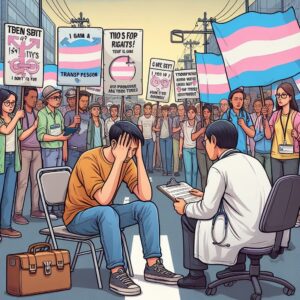Transgenders Mental Health Issues
No healthway post selected for this post.
Being transgender is not a mental health issue. But people who are transgender experience unique challenges, like gender dysphoria and discrimination, which may affect their mental health.

What is transgender?
Transgender is an umbrella term used for people whose gender expression or gender identity differs from the societal and cultural expectations of the binary sex they were imposed at birth. A person who is transgender can be a:
-
Trans man or boy: A person granted female at birth who recognizes as a man or more masculine.
-
Trans woman or girl: A person who is assignedmale at birth and has a female gender identity or more feminine.
-
Nonbinary: A person who does not describe their gender identity exclusively as a womanor a man.
Is being transgender a mental health issue?
No. Being transgender or trans isn’t a mental illness. If you’re transgender, it means that you have a distinct gender identity than the one you were assigned at birth. (The personal sense of one’s own gender is known as gender identity.) The wish to convey your gender in the way you feel most genuine is a normal outlook of human expression.
Gender dysphoria and its effects on transgender people
Gender dysphoria is a condition which affects many trans people before they transition (begin living as their genuine selves). It describes a sense of concern regarding the imbalance between assigned sex and gender identity — and it may occur at any point during lifetime, from childhood to adulthood. Gender dysphoria can lead to various mental health challenges. If left untreated, gender dysphoria can cause extreme emotional and psychological distress.
Transgender mental health issues may include:
-
Shame
-
Social isolation
-
Post-traumatic stress disorder (PTSD)
-
Depression, sense of loss or sadness
-
Anxiety
-
Poor self-esteem or negative self image
The social stigma that a lot of transgender people face can cause them to feel overwhelmed or unwanted. They commonly try to ease these feelings with negative and harmful behaviors that can result in:
-
Drug addiction
-
Alcoholism
-
Self-injury
-
Suicidal behavior
-
Eating disorders
Are transgender people more likely to face other mental health issues?
Research shows that transgender people are somewhat more likely to have a mental health diagnosis. The most common are depression and anxiety. But some conditions are more common in trans people, such as:
-
Schizophrenia
-
Schizoaffective disorder
-
Obsessive-compulsive disorder
-
Borderline disorder
-
Borderline personality disorder
-
Dissociative identity disorder (multiple personality disorder)
Detail of some transgender mental health issues
Depression within transgender community
Depression is a mood disorder which involves a continuous feeling of sadness and loss of interest in activities once enjoyed. A research in 2018 suggests that transgender people can have a around 4-fold increased risk for having depression. This is consistent with a study in 2015 noting that transgender youth have a 2-3 fold increased risk of mental health outcomes, like depression.
Transgender youth face further health issues, as they are twice more likely to face depressive symptoms, extremely consider suicide, and attempt suicide as compared to gay, cisgender lesbian, questioning, bisexual, and queer youth.
The Trevor Project National Surveys in 2019 adds that more than 2 in 3 non-binary and transgender youth report symptoms of major depressive disorder.
It also highlights that more than half of non-binary and transgender youth have actively considered suicide. Of the responders, 29% had attempted suicide. A 2021 article evaluates that factors like cissexism, barriers to care, and victimization can cause transgender mental health issues.
Anxiety within transgender community
Anxiety Disorders refer to a group of mental health conditions that cause recurring or persistent feelings of worry and nervousness. A comparative study in 2016 suggests that transgender people face more significant anxiety symptoms and have a nearly 3 fold increased risk of anxiety disorder.
Stressors can lead to the development of anxiety. Research highlights the role of internalized cissexism, gender incongruence, and gender dysphoria in contributing toward anxiety.
Stress within transgender community
Transgender people are more likely to experience stress. This refers to frequently high levels of stress that people within characterized minority groups face.
Transgender people may face this in the form of interpersonal stressors, like expecting discrimination, environmental stressors, such as exposure to intolerance, and personal stressors, which can reflect internalized cissexism.
A study observes that expecting rejection is a constant and noticeable stressor for the transgender people. Exposure to various social stressors leads to transgender mental health issues.

Substance misuse within transgender community
Substance abuse includes the inappropriate use of illegal drugs and the harmful use of legal substances, like alcohol. A investigation in 2021 indicates that substance use disorder diagnoses are particularly higher among trans adults than cisgender peers.
Risk factors for substance abuse disorders are higher for transgender individuals. A systematic review in 2021 suggests that sex work, cissexism, unemployment, violence, discrimination, and gender dysphoria play a major role in the higher prevalence. Transgender people may use particular substances as a coping procedure to cope with the extreme stresses of routine life.
Low self-esteem within transgender community
Self-esteem commonly refers to how positively a person sees themselves. This can reflect their accomplishments, self-image, and success. A 2018 study indicates that in addition to depression and anxiety, transgender youth are at a greater risk of developing low self-esteem.
A 2014 study indicates that transgender people may face low self-esteem because of experiencing gender dysphoria and incongruence. A 2020 study adds that trans people who are comfortable with their gender identity and appearance have more self-esteem.
This highlights the importance of supporting others to feel more comfortable with their appearance and accept their gender identity to enhance psychological health.
Eating disorders within transgender community
Eating disorders refer to a variety of conditions that involve disrupted or abnormal eating. Research suggests that LGBT people experience a greater prevalence of eating disorders. A 2015 study shows that eating disorders are more common among transgender people.
A study in 2016 emphasizes that abnormal eating behaviors are extensive among transgender youth. Another study in 2016 also suggests that trans youth are more likely to involve in risky weight management behaviors than their cissexual peers.
In addition to the discrimination and stigma that transgender people experience, body dissatisfaction can also cause disordered eating. A study in 2019 notes that many trans people may involve in abnormal eating behaviors for gender-affirming intentions.
The difficulty and barriers that trans individuals experience when trying to approach gender-affirming healthcare may then add to this.
Signs of transgender mental health issues
People with gender dysphoria or transgender mental health issues may have changed their behavior, their appearance, or their interests.
They may also express signs of distress or discomfort, including:
-
Low self-esteem
-
Taking unrequired risks
-
Anxiety or depression
-
Socially isolated or becoming withdrawn
-
Neglecting themselves
Causes of gender dysphoria and transgender mental health issues
The exact cause of gender dysphoria is unknown till now.
Gender development is complicated and there are still a few things that are unknown or not fully understood.
Gender dysphoria is not linked to sexual orientation. People with transgender mental health issues or gender dysphoria may identify as lesbian, gay, straight, or bisexual.
Support for transgender mental health issues
While mental health issues are more common among transgender people, support is available. People can want to consider:
-
Therapy: Individuals may want to get help from a therapist who supports gender nonconforming and trans people.
-
Healthcare: Similarly, individuals may only want to work with healthcare providers who affirm and support trans identities.
-
Activism: Taking pride and involvement in transgender identities can motivate activism and may help with sense of identity and confidence.
-
Identity: People may choose when and to whom they tell about their trans identity. No individual is under any responsibility to tell someone else regarding their identity.
-
Advocacy groups: Joining local trans advocacy groups may make individuals feel welcome and members of a group.
-
Community: Developing connections with other transgender or gender nonconforming people may help banish stigma and stereotype.
Summary
Trans people are more likely to experience mental health issues than other people. They are also more likely to think about and attempt suicide. Many factors, like stigma, oppression, and discrimination lead to these adverse mental health outcomes. All of these factors may also present difficulty in getting healthcare options.
However, many support options are available. People can be able to find advocacy and support from various organizations. Additionally, transgender people should find therapists and doctors who declare and support trans identities.
More Read Transgenders Mental Health Issues
No healthway post selected for this post.
